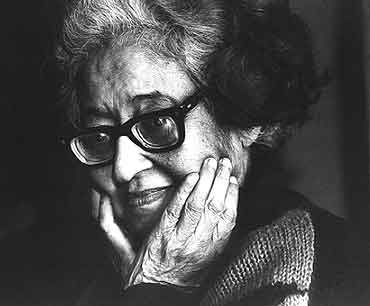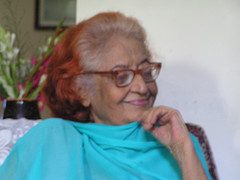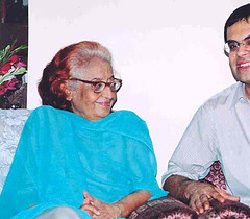by Raza Rumi
 I have been upset the entire day. Perhaps it does not matter in the larger scheme of things. But this is a sad, sad day. Qurratulain Hyder, the literary giant of our times is no more. At a personal level it is not just the death of another literary figure but it is far greater and deeper than that. Ainee inspired generations of Urdu readers and there is not a single Urdu writer of post-independence era who has not been influenced by her.
I have been upset the entire day. Perhaps it does not matter in the larger scheme of things. But this is a sad, sad day. Qurratulain Hyder, the literary giant of our times is no more. At a personal level it is not just the death of another literary figure but it is far greater and deeper than that. Ainee inspired generations of Urdu readers and there is not a single Urdu writer of post-independence era who has not been influenced by her.
Ainee had a civilizational consciousness that took us beyond the nation-state identities that we are so familiar with in our everyday lives. And, of course there was romance – the notion of eastern and Indic romance – that touched our lives. As I wrote earlier, that the way I have understood the world and perhaps parts of myself were deeply influenced by Ainee.
And  now her death is a blow that this source of inspiration is not there anymore; as it is we are living in barren times where literature is about marketing and packaging and catering to consumers.
now her death is a blow that this source of inspiration is not there anymore; as it is we are living in barren times where literature is about marketing and packaging and catering to consumers.
Ainee primarily wrote for herself but reached out and made her mark – and in the process she connected with millions of readers. And I am just one of them. My friends and I have talked today and we recounted how she shaped our inner lives.
 I have at least avoided a regret – I met her after years of longing. Met her twice at her house in her frail state and enjoyed the hours. The impressions were indelible. Of course, the ambitious self had planned a meeting later this year.
I have at least avoided a regret – I met her after years of longing. Met her twice at her house in her frail state and enjoyed the hours. The impressions were indelible. Of course, the ambitious self had planned a meeting later this year.
But there will be nobody in that Noida house. That little temple opposite her house will remain and the sound of Azaan from a neighbouring mosque will also heard. But the hearty laughter, quick witted lines and inimitable writings will not be there.
However, as a friend said – writers die, their stories don’t -makes me a little content.
Farewell, Ainee Apa. May God keep you happy wherever you are…
Photo Credits: The black-and-White photo in this post is courtesy of Prashant Panjiar



















































Raza,
Renowned Poet, Jamiluddin Aali provided another view of the personal reasons for her moving to India. This is really interesting since most of the time I heard that she moved due to Martial Law. According to this that is not the case.
http://www.jang.com.pk/jang/aug2007-daily/26-08-20 07/col6.htm
thanks Alvi Saheb :)
Adnan Mian: thanks for the comment and the reference to the Javiad Iqbal’s autobiography. There is so much that can be said about this – as part of our national traits – but I would not like to digress.
Luckily, I have found a translation of Aag Ka Darya’s foreword and it is on my website
Adnan Ahmad says:
August 24, 2007 at 2:27 pm
-
Pervaiz Munir Alvi says:
August 24, 2007 at 2:21 pm
-
Raza Rumi says:
August 24, 2007 at 1:02 pm
« Older Comments
Newer Comments »
kahee’n to beher-e-khuda aaj zikr-e-yaar chale
Raza, By all means write that piece. I have known most of what you wrote but it’s a pleasure to read these details. By the way from our collection I remember old booklets of her translations.. “alps key geet..” etc. with her picture in the back of the book. She was a beautiful woman.
Pervaiz Sahib, As you very well remember, Javed Iqbal wrote almost a page on Ms. Haider in his brutally honest autobiography even though he skipped the pursuing part. On that same page he also called it unfortunate to have joined the parade blasting the novel. They became friends again much later in life.
To quote shakil adilzada, “one can say Quratulain was born much ahead of her.. and one can also wish she was born even before. “
Raza: Thanks for whetting the appetite. We know you will be back with more nuggets. May be one day we will have moral courage to name an institute or a chair after her. After all Pakistan owns Qurrat-ul-Ain Hyder as much as others do.
Alvi Saheb:
I hope someone attempts that – if not I will obey your command:)
This particular period is also important as it was ironically a major era in terms of the evolution of Urdu literature. Ainee’s life in Pakistan was most colourful. She worked for the Information department – in fact contributed to several documentaries especially in the then Eastern wing (now Bangladesh). It is during this period that she also fell in love with the beauty of Bengal and its rivers, its magic and poetry.Within years, these impressions emerged in the form of Aakhire Shab ke Hamsafar that dealt with pre-Independence Bengal province and characters who then evolve and ultimately are victims of time – and the story becomes a major time travel of human spirit.
This was also the time when she was published in all Pakistani literary journals and also completed Aag Ka Darya in a most casual manner. Imagine producing a novel covering 4th century BC to 1950s at the age 32! It is a pity that not many -globally – know about this work.
This is also the time when she was being approached by admirers who included Javaid Iqbal, Shahab and Ijaz Batalvi etc. However, like her characters, she remained lonely and aloof from all these men despite the fact that she was a beautiful woman. Some of these pictures are in her autobiogrpahical novel referred in my earlier comment.
So she took off for a job with BBC London in 1961 – rather disgruntled and disappointed with a society that was not willing to accept her individuality and freedom to have a larger than life vision of her history and civilization. Right wing Urdu papers wrote against her and the Left chided her for not being a comrade and creating literature dictated by ideology. She wrote from a historical perspective and refused to adhere to ‘theoretical’ ideologies.
And after 1961, she did not return. It is said that Nehru persuaded her to return to India. Nehru also persuaded Ustad Barre Ghulam Ali Khan to return to India – and he did – as he appreciated the stature of these legends and wanted them to be part of India.
More later, when I write the piece – or do I need to now??